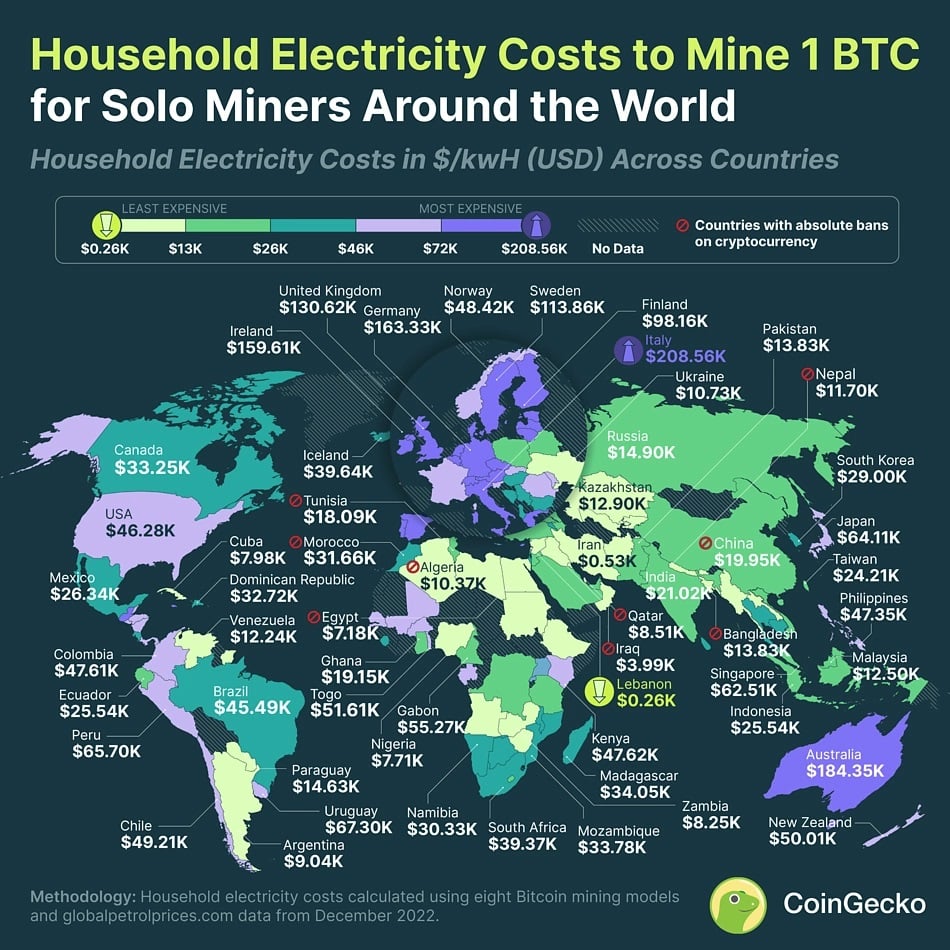
Despite significant variations in electricity rates and regulations, the Asian region as a whole has the lowest average cost of bitcoin mining for solo miners, new research shows. At the same time, the surge of energy prices due to Covid, heatwaves, and the war in Ukraine render bitcoin mining largely unprofitable throughout Europe.
Mining 1 Bitcoin Would Cost $266 in Lebanon, an Italian Miner Would Pay Over $208,000
A solo miner would need an average of 266,000 kilowatt-hours (kWh) of electricity to mint a single bitcoin and the process would take approximately seven years to complete, requiring a monthly electricity consumption of about 143 kWh, researchers have estimated.
While admitting that the days are gone when bitcoin (BTC) could be mined with minimal power and on a desktop computer, they have analyzed household electricity costs across the globe to present prospects for solo miners operating within a decentralized network.
According to the study produced by the crypto asset aggregation portal Coingecko, the average cost of the household electricity needed to mine 1 bitcoin is $46,291.24, which was 35% higher than the average daily price of BTC in July 2023, or $30,090.08.
However, the regional differences in household electricity costs around the world are significant. With an average cost of $20,635.62 per bitcoin, Asia “stands as the sole territory where the average household electricity costs make mining profitable for a solo miner,” the authors point out.
They also highlight the significant disparity between the countries in the region, where Lebanon has the lowest electricity cost of $266.20 and Japan has the highest, at $64,111.02. Nevertheless, half of the top 10 countries where bitcoin mining is most profitable are Asian.

Europe With Highest Average Cost of Household Electricity for Mining
Only 65 countries currently present profitability for solo mining based on household electricity costs alone. Just five of them are in Europe, which has the highest average cost of household electricity, at $85,767.84. Nine of the top 10 most unprofitable countries for solo miners are in that region, with the electricity cost to mint 1 BTC in Italy reaching $208,560.33.
Various factors have contributed to the increase of household power rates on the Old Continent, including the spike in wholesale electricity prices amid the Covid-19 pandemic, growing demand, heatwaves, and Russia’s invasion of Ukraine which affected natural gas deliveries for a number of EU member states.
The researchers also emphasize that the hourly amount of electricity used in the mining of 1 BTC, 4.6 kWh, is not as disparate as one might think when compared to the consumption of other household appliances such as an electric kettle, with 3.5 kWh, or a clothes dryer that burns an average of 5 kWh. Also, the monthly electricity required to mint a single bitcoin is roughly one-sixth of what a typical household in the U.S. consumed in 2021.
What are your thoughts on the findings in the Coingecko study? Share them in the comments section below.
from Bitcoin News https://ift.tt/jf40ZkD
Comments
Post a Comment